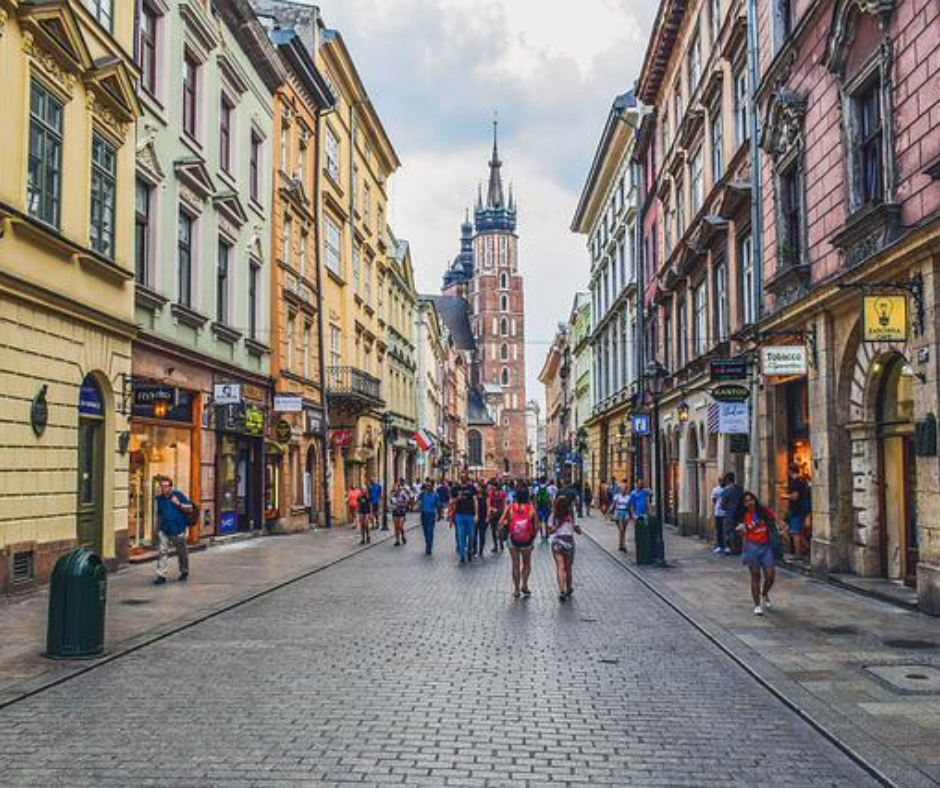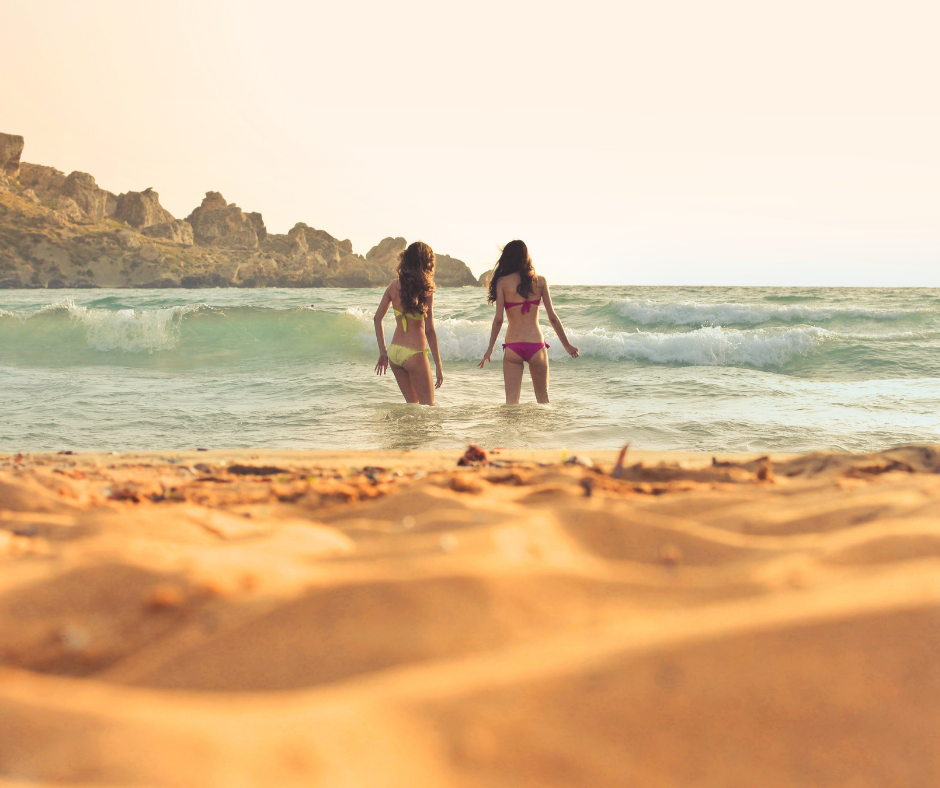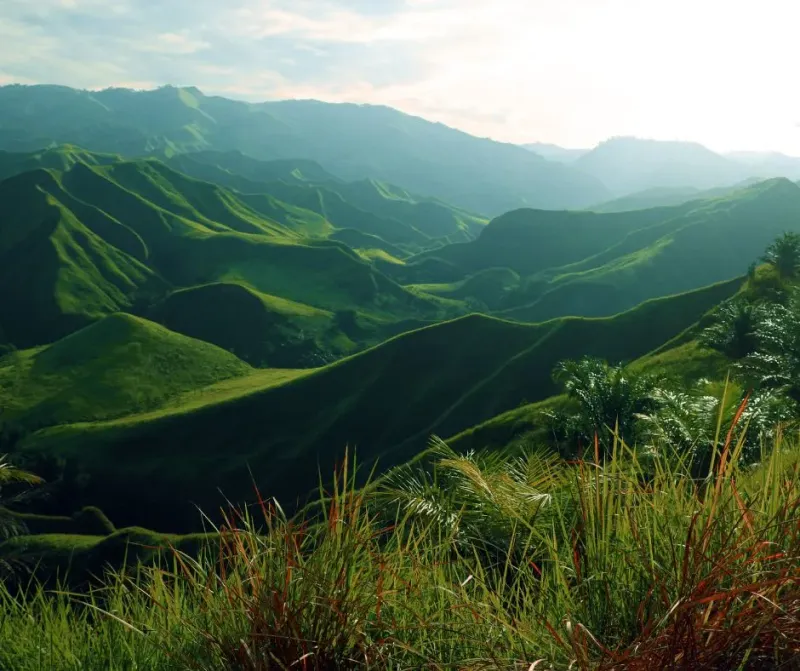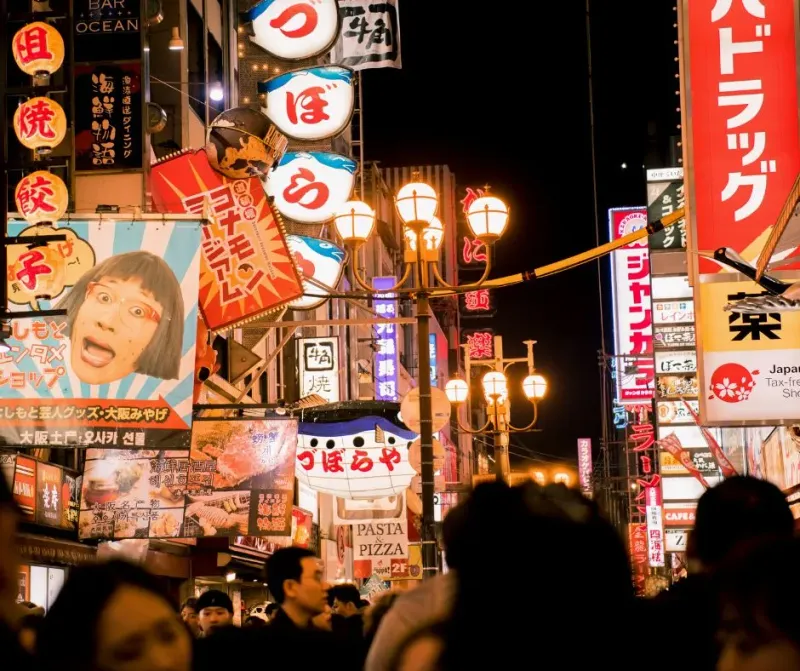Poland counts many famous people, such as the scientists Nicolaus Copernicus, the famous astronaut, who established the heliocentric solar system, and Nobel Prize winner Marie Curie, a physicist and chemist, searching in the field of radioactivity. But also creatives such as the film producer Polanski, and the composer and pianist Chopin contributed greatly to the Polish culture.
The turbulent history of this beautiful country includes being erased from the world map for 123 years, due to the annexation of the Russian, Prussian, and Austrian empires. However, luckily, today Poland is a sovereign state again and an important bridge between Western and Eastern European countries and Polish hospitality shows the openness, and warmth of its kind people.
🇵🇱 Entry requirements for Poland
- Visa: Valid Schengen visa.
- Insurance: Travel health insurance that matches the Schengen requirements. Your insurance policy needs a minimum amount of 30,000 Euros of emergency cover.
🌱 Travel health insurance for Poland
🏡 How to find a place
In Poland, digital nomads meet in Warsaw, Kraków, and Gdansk.
- Facebook groups: For Warsaw, have a look at the following groups: APARTMENTS FOR RENT WARSAW CITY, Warsaw Apartments 4 Rent, and Rent Flat Warsaw. For Kraków, check out Krakow Apartments 4 Rent
APARTMENTS FOR RENT KRAKOW CITY, or Krakow Apartments (NO agents or agencies) For Rent. Looking for an apartment to rent in Gdansk, have a look at Gdansk Apartments 4 Rent. To find a good deal on Facebook, you need to monitor the listings in each group. If you don't want to spend time on that, check out Airbnb, or Vrbo. - Airbnb: Looking for an apartment for rent in Warsaw during summer and when booking last minute can cost around 1,500 to 2,000 Euro rent. In the winter months, prices drop more than half. You can book an entire place for 700 to 900 Euro per month or even less. Kraków offers rents starting at 450 Euro for a whole flat in the winter months. During summer, prices are around 650 - 900 Euro per month. Gdansk in summer months reaches prices around 900 - 1,300 Euro for an entire place. In winter, prices drop slightly to 750 - 950 Euro.
- Vrbo: An alternative to Airbnb is Vrbo, a similar booking platform with many options.
- Coliving: May you want to combine your stay with your workplace? Then it might be worth checking out coliving spaces which include a workspace, coworking facilities, and access to the community. In Warsaw, you find Vonder Coliving which comes with 2 locations and a monthly rent of 4,300 to 4,500 PLN (Polish zloty) (923 - 966 Euro).
✈️ How to get to Poland
- Plane: Poland is one of the biggest countries in Central Europe, and its international airports are well connected, domestically and internationally. The country is linked to Asia and North America, too. Besides the national carrier LOT, you can find many European flights operated by Ryan Air and Wizz Air. Internet at the airports is free, but in Gdansk and in Kraków you need to pay after 15 minutes. In Warsaw, the internet is unlimited and free. Arrived at one of the airports, you can take several buses, taxis, or the train to the city center. It is not advisable to book Uber and co., as especially Warsaw shows rising scams with drivers' no-shows and cancellations at your cost.
- Train: Poland is part of Eurail, and it is easy to travel from neighboring countries, such as Germany, the Czech Republic, Slovakia, and usually Ukraine as well, to Poland. But also to Vienna, and further places have good connections to Poland.
- Bus: Europe has an excellent bus network, and one of the interstate bus companies is Flixbus.
🚌 Public transport
- Warsaw: In the capital, you can choose between tram, metro, buses, and urban trains. A single ticket is 4.40 PLN (0.95 Euro). Bus no. 180 is a bus line taking you to many tourist places in the city.
- Kraków: You find a good bus and tram network in Kraków. To plan your journey, you can use this website. All tickets are valid for both trams and buses, as long as you don't cross the city line. Tickets must be validated inside the tram or bus.
- Gdansk: Also in Gdansk, trams and buses are widely available, and you can take buses to visit neighboring cities such as Gdynia, and Sopot. If you want to visit all three cities (Gdansk, Gdynia, and Sopot), you can purchase the Gdansk Tourist Card. When staying longer in Gdansk, you can buy monthly tickets.
- Taxi: Relatively inexpensive is the use of taxis in Poland, which cost usually between 1.80 and 3 PLN (0.40 - 0.70 Euro) per km. During the night, prices can double. When taking a taxi, you need to pay in cash as the drivers usually don't have credit card terminals.
- Uber: Don't use Uber in Warsaw, it is reported frequently that drivers cancel and you get charged the cancellation fee. You can use Bolt, which is a bit better, but many drivers are foreigners, do neither speak English nor Polish, and have nearly no knowledge of where to drive.
🏘 Where to stay in Warsaw
- Old Town in Śródmieście: When staying in Warsaw for the first time, or for a short time, it is nice to stay in the UNESCO-protected Old Town in the large Śródmieście district, as you have many sites around.
- Praga Polnoc: If you are on a budget, check out Praga Polnoc, on the other side of the Vistula River. Here you find more affordable apartments to rent, parks, many restaurants, a lively bar, and an art scene. It is often referred to as the cool place to stay in Warsaw.
- Mokotów: A more family-friendly neighborhood is Mokotów, a trending neighborhood with bike lanes, parks, shopping malls, international restaurants, and hip bars.
🧑🏻💻 Where to work from in Warsaw
Coworking spaces
- Noa Cowork: Located in the Mokotów district, this place focuses on community, offering not just 24/7 access but also a wide range of weekly events. The monthly coworking rate is 550 PLN (118 Euro). You can message them and ask for their free trial day.
- Brain Embassy: This coworking space has different locations in Warsaw, e.g. in the Mokotów district, it comes with an open floor plan, ergonomic furniture, a popcorn machine, and access to community events.
Coffee shops in Warsaw
- Etno Café: This café brand has a few branches in town, and they are great to work from and have good coffees, and food. Wifi is stable, and the tables are decent to work from.
- Nancy Lee: Another coffee shop to work from in Warsaw is Nancy Lee, a small but cozy place with delicious food, especially breakfast.
- Cofeina: Near the stop Politechnika, you find the café Cofeina, a great place to eat, and stay for long hours, as it closes at 11 pm (except for Sundays, when it closes earlier).
🏘 Where to stay in Kraków
- Stare Miasto: This district includes the old town of Kraków, the Wawel castle, the old Jewish quarter Kazimierz, and a few other neighborhoods, and the area is part of UNESCO World Heritage since 1978. Staying in Stare Miasto is especially nice when visiting Kraków for the first time, or for a short time as you have many sites within walking distance.
- Ludwinow: Life music, street art, flea markets, bars in abandoned hotels from the Soviet era, this neighborhood is a hip and trending place to stay in Kraków.
- Grzegorski: When visiting Kraków on a budget, consider the student-friendly Grzegorski neighborhood, officially known as district 2. This laid-back area has some green spaces, for example, the overgrown Jewish cemetery, and the botanical garden.
🧑🏻💻 Where to work from in Kraków
Coworking spaces
- Yolk: For around 450 PLN (100 Euro), you can join the Yolk coworking and community space, a welcoming place with regular events, from runners' groups to movie nights. Tea and coffee are for free, and they offer day and week passes in the most flexible way. The place is located between the Jewish quarter and Old Town.
- Kalifornia: This coworking space doesn't look like a workplace but more like a cozy home with a wooden floor, a hammock, bookshelves, and a community kitchen. You can run to the gym and take a shower at the coworking if you want. Month plans start at 750 PLN (160 Euro).
Coffee shops
- Fitagain: Near the Old Town, and close to the university, you find this little coffee shop, a perfect place to meet friends for breakfast, or visit in the afternoon for your favorite coffee and a work session.
- Przestrzeń Pełna Czasu: Not an easy name when you don't speak Polish, but this coffee shop is worth safe in your phone. Near the Grzegorski neighborhood, this place has a little shop, a great food menu, and an upper floor just made for working.
🏘 Where to stay in Gdansk
- Main Town: When visiting Gdansk for the first time, check out Main Town, also known as Główne Miasto, which comes with many historical sites, and a beautifully restored riverfront. It is a touristic part of town but also the one with so much to see.
- Old Town: If you are on a budget but you want to stay close to Main Town, have a look at Old Town, Stare Miasto. Highlights are the historic buildings, the warehouses, and old workshops, which turned into museums or restaurants.
🧑🏻💻 Where to work from in Gdansk
Coworking spaces
- Good Space Coworking: Strong internet, good coffee, and a casual but productive atmosphere would describe Good Space well. You can buy memberships by hours, day, weeks, or months, and enter the space 24 hours/7. For every hour of coworking, 1 PLN will go towards a social project and you can co-decide and vote for which one this month.
- Leśna Hub: This coworking space is north of Gdansk, in Sopot, half way to Gdynia. The membership plans are flexible, a 15-day pass is 450 PLN (100 Euro), and a 1-month membership is 778 PLN (168 Euro). You can reach the space with the SKM commuter train, and the train station is 4 min. from the space.
Coffee shops
- Drukarnia: In the Main Town, you find Drukarnia, a small café, centrally located but hidden from the main tourist footfall. Their menu is small but the items are delicious, and more of a snack. You can work inside and when the weather allows outside as well.
- Josef K: This café, club, bar, and restaurant is for those who seek a different experience from the candy-colored coffee shop scene of Gdansk. Josef K. is edgy, rough, and definitely unique. The service is a bit slow at times, but the staff is friendly and you get a lot to see, from old records to books, vintage stuff, and art.
- Jak się masz?: From breakfast to lunch to dinner, this café near the Park Oliwski in the Oliwa district in the north of Gdansk, serves delicious food and coffee and offers good tables to work from for a few hours.
🚊 How to travel around Poland
- Train: Poland has a good railway network, and when considering the hassle to get a parking lot, it is recommendable to switch to public transport, especially when traveling from one city to the next. Similar to many European cities, also the train stations in Polish cities are often located within the city center, and especially when staying in the center, you can get connecting buses, and trams to your final destination.
- Warsaw - Kraków: 2 hours, 16 min. by train, tickets between 5 and 25 Euro.
- Warsaw - Gdansk: 2.5 hours train ride, tickets between 40 and 60 Euro.
- Kraków - Gdansk: 5 hours by train via Warsaw, tickets 20 to 40 Euro.
- Gdansk - Poznan: 3 hours by train, tickets between 10 and 20 Euro.
The longest ride for one of the main cities might be between Kraków and Gdansk which is a good way to stop in Warsaw for a few days or a week. - Bus: Taking the overland bus will mostly take longer than taking the train. For example, the journey from Warsaw to Kraków takes 4 hours, and the tickets cost between 10 and 20 Euro. Considering cost and time, it is recommendable to check out train connections first.
- Car rental: To rent a car you need to be at least 21 years old and hold your license for a minimum of one year already. Drivers younger than 25 years old might be charged an extra insurance fee. In Poland, you will drive on the right side of the road. Keep in mind that Warsaw, Kraków, and Gdansk (and many other bigger cities) have dense traffic, and finding parking is difficult.
🎖Must see in Poland
- Warsaw: Visit the Old Market square, as well as the Lazienki Park and Castle, a former bathing spot for noblemen in the 17th century. Today the Lazienki Park and Castle is open to the public, as well as the beautiful gardens around. Every Sunday morning, free piano concerts are held here.
- Gdansk: Stroll down the Dlugi Targ, a wonderful street only 500 meters long with restored historic buildings to each side, restaurants, cafés, and shops, you will pass the Golden Gate and the Town Hall tower. Including the Neptune Fountain, the Artus Court, a former meeting point for merchants, and now a museum. Opened in 2016, the WWII Museum impresses with modern architecture, and touches deeply with the human tragic Polish people have faced during the world wars. The museum today is one of the must-visit sites in Gdansk.
- Marlbok Castle: A 45 minutes train ride brings you to the marvelous Marlbok Castle, a 13th-century Teutonic castle built by the Teutonic Knights. It is the world's largest castle by land area and serves as a museum.
- Kraków: The city owns an eclectic castle, the Wawel Royal Castle, which is listed as a UNESCO World Heritage site. King Sigismund I the Old, who lived in the castle in the 16th century was an art collector, and so today the castle hosts an art museum. If you are interested in Polish history, visit Schindler's Factory which got famous after Steven Spielberg's movie Schindler's List.
- Wieliczka Salt Mines: When in Kraków, you should visit the Wieliczka Salt Mines which is a 40 minutes train ride from the city. The salt mines produced table salt from the 13th century until 2007. Today, the mines are a museum and listed as a UNESCO World Heritage site. The museum includes the shafts and labyrinthine passageways, as well as an underground lake and four chapels. You can also find sculptures created by former salt miners as well as contemporary artists.
- Auschwitz-Birkenau Memorial: The history of Europe is overshadowed by the Nazi occupation and the holocaust which caused the death of millions of Polish, Roma, and Jewish people. Although this site shows the horror of history, it is a very important place to visit as the lives of the victims shall be never forgotten. You can reach the memorial site by train from Kraków in 1:45 hours.
💡Good to know
- Internet: The median internet speed for fixed broadband is about 92 Mbps download and 31 Mbps upload speed.
- Sim card: You can choose between 4 main operators, subdivided into more than 15 different sim card providers which makes it a bit overwhelming. On the plus side, Poland comes with affordable price tags for data packages. A good provider is Orange, and you can get the sim card at the airport, in grocery stores, petrol stations, and in Orange shops.
- Digital nomad community: There are no nomad Facebook groups dedicated to Gdansk or Kraków specifically, however, the main digital nomad spots in Poland are Warsaw, Kraków, Gdansk, and Wroclaw. You can check on meetup.com and Eventbrite for groups and events, and you can also contact a coworking space and ask about their community.
- Cost of living: Rent prices for an apartment can be anywhere between 600 and 2,000 Euro per month, depending on the city and the time of the year. In the winter months, many cities in Poland are much more affordable than in the summer months. You can calculate a monthly budget of 1,500 to 1,800 Euro without coworking space.
- Currency: The polish zloty is the main currency, and 1 PLN converts to 0.20 Euro or 4.65 PLN to 1 Euro.
- Climate: Poland has a moderate climate with continental and maritime elements. Summers are warm to very hot, autumns are crisp and sunny, and winters are really cold with snowy mountainous areas. If you are chasing warmer weather, come between May and September.
- Safety: In 2021, Poland shows an increase in safety of 8.5% compared to the previous years, and the country now ranks 17th in the Global Peace Index for Europe, and 24th worldwide.
- Dobre maniery: Polish have good manners. When taking public transport, you will see people making space for elderly people or pregnant women, men helping women in their coats, strangers holding doors open, and even greeting others in the lift or saying goodbye when leaving the lift.
🚧 What to avoid
- Jaywalking: Crossing streets at any time, or walking through a red sign at the traffic light can get you a fine of some hundred zlotys.
- Alcohol and barbecuing in public: Allowed in neighboring Germany, both, drinking alcohol in public or doing a barbeque on public ground is strictly forbidden in Poland and you risk a high fine when caught.
🚴🏻♀️ How to stay healthy
Stay active
- Hiking in the Kampinoski Park: Around a 1 to 2 hours drive from Warsaw, depending on how you travel, you find the Kampinoski Park, which offers many hiking trails for different fitness levels. You can hike the Wolka Weglow-Sierakow Loop, a 16 km loop labeled as moderate level.
- Hiking in the Ojców National Park: Near Krakow, you find the Ojcówski National Park, which offers trails through the thick forest, passing old castle ruins, and lakes. The trails are not just great for hiking but also popular among mountain bikers.
- Skiing in Zakopane: When visiting Poland in winter, you find the beautiful town of Zakopane just a 2-hour drive south of Kraków. When coming in summer, the Tatra National Park is a famous hiking destination.
Health risks
- Water quality: You can drink tap water in Poland.
- Air quality: The air quality in Poland is moderate. The biggest air pollution comes from coal emissions, which peak in the winter months due to heating homes and public spaces. Another reason for the bad air in Poland is the rising number of vehicles, mainly heavy trucks.
⚓️ Long stay
There is no digital nomad visa in Poland at the moment.






